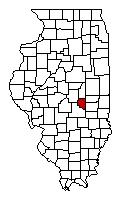|
JOHN W. WOOD. The acquisitive faculty is one which some men possess in a high decree,
and in which others are almost totally deficient. We frequently associate characteristics
which are not admirable with one who is thus endowed. This, however, is neither just nor
correct, for this faculty is as distinctly a gift of the Creator as is a mechanical, musical or poetical genius
in people whom we cannot laud too highly for the results of their work. The name that heads
this sketch is that of a man who possesses the acquisitive faculty in a large degree, and at the same
time, he is generous and open-hearted to a fault. He is a prosperous, well-to-do farmer, owning four
hundred and fifty acres of fine land upon which are the best improvements, a pleasing and attractively
built house, good barns and granaries, sheds and outbuildings for the shelter and protection of his stock.
Our subject was born in Moultrie County, Ill., February 28, 1850. His parents were Joseph M.
and Purletha (Patterson) Wood, natives of Kentucky and Illinois, respectively. For a further history
see sketch of J. A. Wood in another part of this volume. He of whom we write was reared on
a farm, and received the educational advantages common to boys of his age and position in life.
On reaching manhood he was attracted by the charms and virtues of Miss Mary J. Kirkwood, and
November 2, 1871, their nuptials were celebrated at the home of the bride's parents, who were James
and Ann J. Kirkwood. Mrs. Wood was born in Ross County, Ohio, December 31, 1852.
The married life of Mr. and Mrs. Wood was blessed by the birth of seven children, two of whom
were taken into the fold by the Good Shepherd, while yet in the purity of infancy. Five of their
children reached years of maturity; Minnie S., died February 22, 1891, at the age of seventeen years.
The living children are: M. Rosella, Joseph W.; James A. and Freeda E. Our subject in his religious
belief is non-sectarian, which does not, however, indicate that he is either infidel or atheist, as
he believes fully in the goodness and mercy of a Divine Creator and Father. In political affairs he
is an ideal follower of Tolstoi, making no active opposition to any political party or measures, and
in consequence favoring no party. He does not vote because it is contrary to his religious belief to
do so, leaving all political matters to solve themselves by natural evolution, that is guided and governed by God.
Portrait and Biographical Record of Shelby and Moultrie Counties, 1891 - p. 333
Transcription copyright 2003/2007, Moultrie County ILGenWeb/USGenWeb
|
